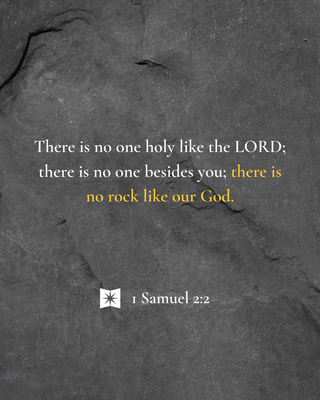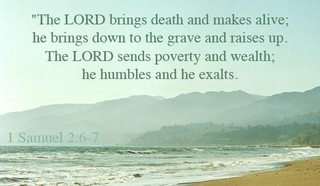
- Recent Translations
- All Translations
Images for 1 Samuel 2:5


Share

Share

Share
1 Samuel 2:5 in Other Translations
1 Samuel 2:5 Meaning and Commentary
They that are full have hired out themselves for bread
Such as have been full of the good things of this life have been stripped of all, and reduced to such circumstances as to be obliged to hire themselves out to persons to labour under them for their bread. Hannah has either respect to some instances she had known, or prophesies of what would be hereafter, and was fulfilled in the Israelites, when in the hands of the Egyptians and Assyrians, ( 4:6 ) and may be exemplified in the case of the prodigal son, ( Luke 15:13-16 ) and is true of such who have larger gifts, but not grace, and which they exercise for lucre sake, and are mere hirelings; and of self-righteous persons who are full of themselves, of their goodness and righteousness, purity, and power; are quite mercenary do all they do for gain, work for life, and labour for perishing meat, and for that which is not bread, and is unsatisfying:
and they that were hungry ceased;
that is, from being hungry, being filled with good things, having a large and sufficient supply to satisfy their craving desires, ( Luke 1:53 ) . Such are the changes sometimes in Providence, that those who have lived in great plenty and fulness are obliged to work for their bread; and, on the other hand, such as have been starving, and in furnishing circumstances, have been brought into very plentiful and affluent ones. The "hungry", in a spiritual sense, are such who hunger an thirst after Christ, and his righteousness, for justification before God; after him and his blood for the remission of their sins, and the cleansing of their souls; after him, and salvation by him, in whom alone it is to be had; after a view of interest in him, and a greater degree of knowledge of him; and after more communion with him in his word and ordinances; and after the enjoyment of them for that purpose: now when they enjoy what they are craving after, they cease to hire out themselves for bread, as others do; they do not cease from working, but from dependence on their works, on which they cannot feed and live, having found and got other and better bread to feed upon; they cease to be hungry, for they are filled and satisfied with the love of God, with the righteousness of Christ, with the blessings of grace, and salvation by him, with the goodness of his house, and with all the fulness of God and Christ; and so having what satisfies them, they desire no other food, shall have no more want, or be in a starving condition any more, especially this will be the case hereafter:
so that the barren hath born seven;
meaning herself, who had born many, even five children besides Samuel, ( 1 Samuel 2:20 1 Samuel 2:21 ) which either was the case before this song was delivered; or rather what she believed would be the case after Eli had blessed her, and prayed for the children by her; seven being a number put for many, ( Proverbs 24:16 ) ( Isaiah 4:1 )
and she that hath many children is waxed feeble;
and incapable of bearing more; and stripped of what she had; this may be understood of Peninnah, concerning whom the Jews have this tradition F15, which Jarchi relates, that when Hannah bore one child, Peninnah buried two; and whereas Hannah had five, Peninnah lost all her ten children. This may be applied to the case of the Gentile and Jewish churches, under the Gospel dispensation, when more were the children of the desolate or barren, the Gentiles, than of the married wife, the Jews, ( Isaiah 54:1 ) .
F15 Vid. Hieron, Trad. Heb. in. lib. Reg. fol. 34. K.